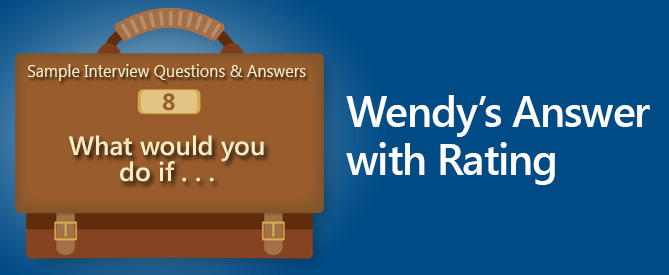 (Who is Wendy? Wendy – Executive and recent Chief Operating Officer seeking Controller position)
(Who is Wendy? Wendy – Executive and recent Chief Operating Officer seeking Controller position)
Terry: Tell me what you would do if you identified some improprieties within the accounting transaction.
Wendy: That’s a really good question and I think the first thing would be to make sure that I gathered sufficient factual evidence. So if something looked a little unusual or there were some red flags I would first delve into it a little bit more.
So I would look back at some documents, do some analysis of some numbers if it looked unusual, ratios or to look for approvals that didn’t seem appropriate, depending on what the issue was.
Then I would discuss the situation with the person. Before I even got to the person I would communicate my concern to the appropriate legal counsel within the organization to make sure that we were doing this completely on the up and up. If the company has a policy around how you handle these things that I follow that policy.
Then I would address it with the individual. I have been involved, in the past, with some interrogations around potential fraudulent activity, so I do know how to ask those kinds of questions that at first appear like you’re a little ignorant and then you let the person get their guard down. Then, all of a sudden, they start to disclose some things that allow you to zero in on it.
But I would be very quick to address it. I would not let it drag on, because if you handle it the right way and you’re wrong, you know, you’ve investigated, but hopefully you haven’t created any further issues. If you’re correct in your assumptions the quicker you bring this to a head the less exposure you have for your organization.
Terry: Tell me more, I mean obviously not names or individuals or even organizations, but walk me through that process that you eluded to where you said you were involved in a situation where you did have to be part of an interrogation. Take me through what happened there and what you did.
Wendy: The initial identification, let’s say it’s a potential problem, it was in my audit days, in my internal audit days, and it came from a report that we would get from a number of distribution centers. That report had some key ratios that we looked at every month, things like inventory turns, inventory shortages, different ratios and you compare the ratios among the different distribution centers and you identified the out liar.
In this particular case, one of the centers, the inventory shortages were averaging about 25 to 30% where in most of the locations they would say 5 to 10%, so it was definitely an out liar. It was an operation where there was one person that handled the inventory and the walk up, if you will, the cash collections when people walked up and purchased things just off the counter. It wasn’t a very sophisticated system.
So there was some concern and what I did was I scheduled an audit there, had my audit team go in and conduct our traditional field audit. I led them in the right direction by saying here are some specific transactions I’d like you to look at, but I did not make the auditors aware, so they were going in somewhat unbiased.
They gathered data, provided their feedback to me and then I came out on the last day of the audit and conducted an interview with the individual who managed the center. I said I just want to follow-up on some things we found. What do you think about this? What do you think about that? Got some feedback, I guess, that was somewhat contradictory.
So, I still wasn’t comfortable that I had enough to confront them, so what we ultimately did is we engaged an outside private eye to come in and watch the warehouse.
It turned out that in the evenings people were coming up and this individual was putting inventory in vans and trucks and non-authorized vehicles. With that information we were able to go to the police and file a complaint and file charges against the individual.
Here’s how I would rate this answer . . .
Q8. What would you do if . . . – WENDY QUICK RATING – A
Good response initially, but even better when you gave specific example, even though didn’t need to because situational “what if.” Your experience telling like behavioral interview answer made it much stronger.
This Guide will help you with samples and complete how to answer training for even more questions you face in your job interviews.






